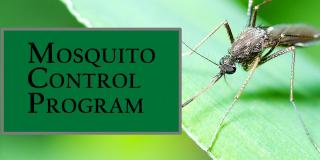The Town of East Hartford Begins Mosquito Control Program

The Town of East Hartford has begun its annual mosquito control program with the goal to reduce mosquito population in town. The town has commenced its annual control campaign applying larvicide to known mosquito breeding grounds, and is preparing for truck-mounted spraying in affected areas of town throughout the summer.
Due to an exceptionally wet spring, the mosquito infestation in East Hartford may be significantly worse this spring and summer than it has been in previous years. While the Town is adjusting its mosquito control program accordingly, residents will likely see more mosquitos this year. Therefore, Mayor Marcia A. Leclerc and the East Hartford Health Department staff are requesting the cooperation of town residents to help control mosquito populations in East Hartford and reduce the possibility of a threat from diseases that can be spread by these insects, like West Nile and EEE Virus.
“We firmly believe in taking proactive measures to ensure the safety of our residents,” said Mayor Marcia Leclerc. “The Town of East Hartford has the most aggressive mosquito control program in our region, and we apply effective measures to reduce mosquito populations and ensure the safety and comfort of our residents.”
Residents can greatly help the Town control mosquito populations by removing sources of standing or still water (prime mosquito breeding grounds) such as clogged gutters, tarps, tires, rain barrels, children’s toys, lawn ornaments and flower pots. Residents should also take protective measures to reduce contact with mosquitos, such as reducing time spent outdoors at dawn and dusk in heavily infested areas, wearing long sleeves and pants and using insect repellants.
The Town of East Hartford treats major watercourses and wetlands in town that are prime breeding areas for mosquitos. The town also treats drainage catch basins and sprays in particularly infested areas of town. The Town does not have the resources to spray private property, and residents are asked to assist the Health Department by reducing mosquito breeding areas on their property. The Health Department asks all residents to walk around their yard and check for standing water. Typical problem areas that collect water are clogged gutters, tarps, tires, rain barrels, children’s toys, lawn ornaments and flower pots. As little as a teaspoon of water left standing for more than four days will allow mosquitoes to begin their breeding cycle. Residents should actively empty all standing water until the first killing frost.
If you own a pool that is not in operation or have standing water on your property that cannot be drained, you may purchase ‘mosquito dunks’ containing larvicide from the Health Department for $10 for a pack of 20. In addition to reducing the number of mosquitoes by removing standing water, residents can avoid exposure to mosquitoes by limiting the time spent outside between one hour before and one hour after sunset.
Repellents are also recommended to avoid mosquito bites if you spend time outside in the evening. Consumer Reports recently compared mosquito and deer tick repellents and recommended several containing 15-30% DEET. A repellent containing oil of lemon eucalyptus and one with 20% picaridin as active ingredients were also recommended. The American Academy of Pediatrics does not recommend use of repellents containing more than 30% DEET for children. It is unlikely to be beneficial for most residents to use DEET in concentrations above 30%.

